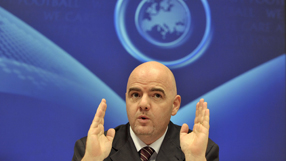
Despite revenues going up, European football's governing body UEFA is becoming increasingly concerned and will publish a report on the scale of the problem next month before bringing in new tougher regulations later this year.
The new rules will be part of UEFA's club licensing regulations in 2012-13, meaning that from 2013-14 clubs must break even - only spending the money they generate - or risk facing exclusion from the Champions and Europa Leagues.
UEFA does not believe major clubs will start to fold but it is worried that if the financial problem is not tackled now, it could spiral out of control.
"I would not paint such a cataclysmic picture of major clubs folding because football has always shown there can be solutions but having said that, we are seriously worried to see these trends. The clubs themselves are worried, the leagues are worried," Infantino said.
"These are the reasons that pushed us to take the decision to do something and what is healthier and what can bring a more sustainable model than saying you cannot actually spend more than the revenues that you generate.
"One could say if a club goes bust 'who cares?'. But we care. We care for that club and all the other clubs who would have problems because one club has gone and not paid them and then there is a spiral," added Infantino.
"We are doing this after very detailed research which we will publish next month. Our report has analysed 650 clubs all over Europe and it shows around 50 percent of those clubs are making losses every year -- and 20 percent are making huge losses every year.
The best features, fun and footballing quizzes, straight to your inbox every week.
"Huge losses mean more than 20 percent of their revenue. It also shows of these 650 clubs more than one-third are spending 70 percent or more of their income on salaries only -- which is worrying," said Infantino.
"The other element, which is again worrying, is that last season revenues in European football generally went up by 10 percent which is very positive. But, on the other side, the increased costs have gone up 11.5 percent and player salaries have gone up 18 percent."
FAIR PLAY
As a result UEFA's Financial Fair Play (FFP) initiative was sanctioned by the executive committee last year.
With the backing of all the game's stakeholders including wealthy owners like Chelsea billionaire Roman Abramovich, that will mean that from the 2013-14 season, clubs must break even or face sanctions which could mean exclusion from European club competition.
UEFA draws a distinction between clubs in debt and those making losses. UEFA will not penalise clubs in debt to their own banks but those who owe money to other clubs, or who have not paid their players and staff salaries.
Clubs who continually lose money over a multi-year period will also face sanctions.
"The main reason for financial fair play is it is a tool to help improve the long-term stability and the financial health of European club football," Infantino said.
"It should help clubs live within the revenues they generate."
 Join The Club
Join The Club





